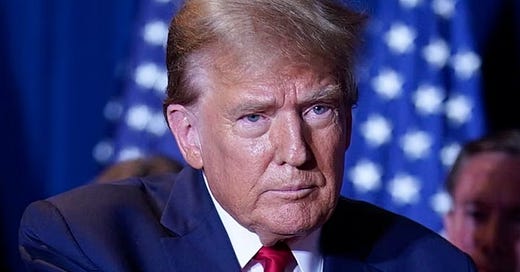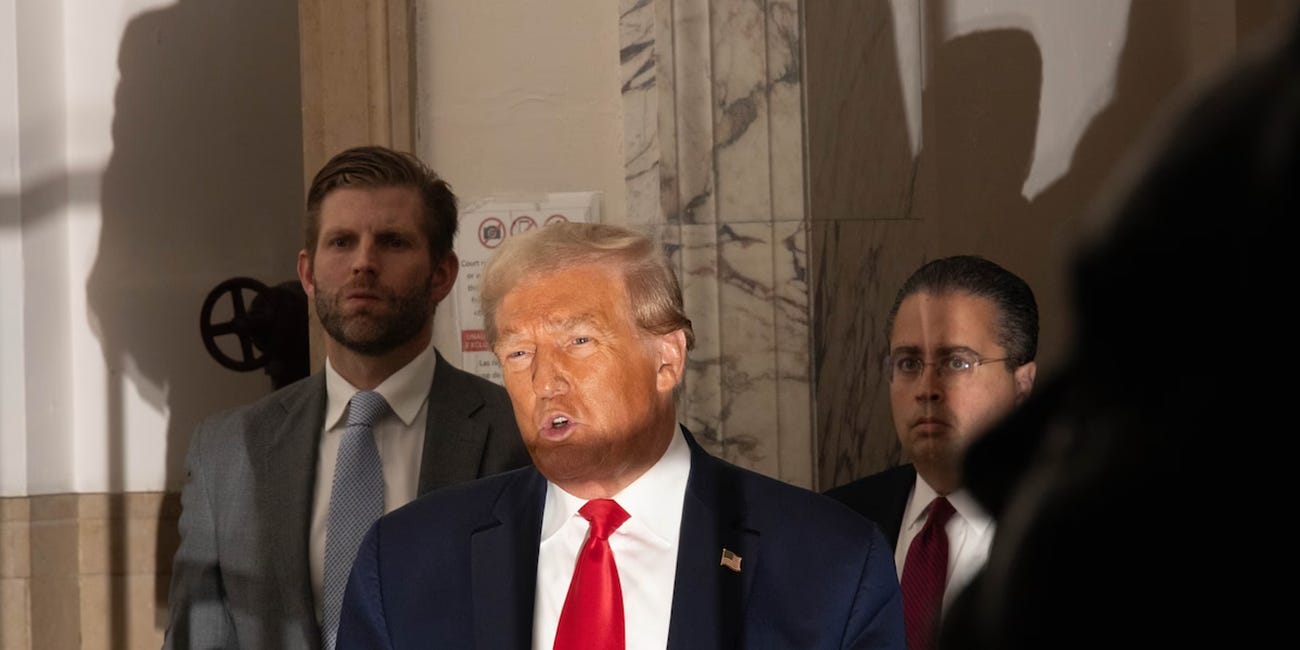A Wrench in Trump's Civil Service Purge Plans
The Biden administration just issued a new rule to block Schedule F - will it work?
The Biden administration announced a new rule last week aimed at blocking a key plank in Trump’s plan for a more authoritarian government. The Schedule F executive order would allow Trump to force career civil servants to become political appointees, who can then be dismissed by Trump or his loyalists in government. The order was rescinded by Biden, but Trump wants to bring it back. The new rule, issued by the Office of Personnel Management, will significantly limit the ability of a future administration to use Schedule F for a mass purge. So, will it work?
A quick recap on what a “rule” is: Congress allows federal agencies to make rules, which have the force of law. This delegated authority comes with conditions. Most obviously, the rule must be consistent with laws Congress has passed. The process also seeks to be democratic. Proposed rules must be presented to the public, receive public comment, and consider and respond to that comment before a final rule is published. Rules also have to rely on scientific and technical evidence. This limits the ability of the President to impose arbitrary rules (and is one reason why the vast majority of Trump rules that were challenged in court were overturned).
Back in November, while the public comment period for the Schedule F rule was open, I encouraged people to submit a comment. Contrary to what you might think, these comments really matter. Agency officials are obliged to read and address them. Lots of you did, contributing to over 4,000 comments on the proposed rule. Thanks to everyone who took the time to comment or share information about the rule. The comments ran 2:1 in favor of the rule, opposing Trump’s goals with Schedule F.
So I want to take a little more time to unpack what the rule will and will not do. The bottom line is that the rule is a good thing. In the absence of legislative action (Dems passed a bill blocking Schedule F when Pelosi was speaker, but were unable to find a GOP Senator who would agree to the inclusion of this language in a must-pass bill), the rule is the only government action we will see on Schedule F, at least until the lawsuits begin. But its important to understand that the rule will not stop Trump from trying to re-impose Schedule F if he returns.
What does the rule actually do?
The substance of the rule is to establish three standards:
First, an employee cannot have civil service protections involuntarily removed by Schedule F. Career officials can become political appointees if they wish, which has always be the case, but they cannot be forced to, as Schedule F would seek to do for the first time. This removes the coercive aspect of Schedule F.
Second, the rule narrows who would be eligible for a Schedule F role. The rule clarifies that the language of “confidential, policy determining, policymaking, or policy-advocating” is a term of art, intended by Congress to describe the type of people already in political appointment positions rather than to open a Pandora’s box of mass politicization. This language comes from the 1978 Civil Service Reform Act, which exempted such positions from the career civil service. I wrote an analysis of the law based an oral history of the passage of the CSRA. It was clear that members of Congress in 1978 wanted the federal bureaucracy to be more flexible, but they were also deeply concerned about politicization. The memories of Nixon's abuses of federal civil servants were fresh in their mind. The idea that they were deliberately laying out a template where a President could strip tens of thousands of employees of their protections against politically-driven removal simply is simply not credible. It was not that such a move was debated and rejected — it was so far away from where the legislative negotiations were that it simply was not considered. In this respect, the new rule more accurately aligns policy with Congressional intent than the designers of Schedule F did.
The broad interpretation of the CSRA language that Trump officials want to make is pernicious not just because it is ahistorical, but because it offers no meaningful constraint on politicization. When Trump officials at OMB tried to implement Schedule F, they sought to convert office managers, human resource specialists, administrative assistants, and cybersecurity specialists into political appointees. With this sort of standard, we would go from 4,000 political appointees today to hundreds of thousands of appointees. One school of thought is that almost any public employee has a policymaking role, because the process of implementing policy is also the process of interpreting and remaking policy. Take, for example, the ways in which two police officers might use their discretion very differently. In doing so, they are using their policymaking power. This is an insightful observation about how administrative discretion makes it difficult to draw a clear line between policy and administration. But it doesn’t follow that we want all cops to be political appointees, loyal to a party leader rather than the public. Indeed, the opposite is true — we want them to be accountable to standardized processes, to use their discretion for legitimate rather than partisan purposes.
Third, if Schedule F returns, the rule establishes requirements for how it would operate, setting up an appeals process for employees if the move is involuntary. The original Schedule F seeks to limit appeals processes generally, including for firing. As Professor Don Kettl has noted, this appears to be contrary to the rights of employees to appeal firings for political reasons. This is not a hypothetical issue. The federal government is being sued now by a former civil servant that government investigators agreed was fired by the Trump administration because of their liberal politics.
More than a speed bump?
James Sherk, who came up with the idea for the Schedule F order, described the rule as a “speed bump” that would only delay its inevitable return. Sherk also took the time to personally write a comment rebutting my comment to the rule:
Quite the compliment!
Trump, and his supporters who occupy the Project 2025 space are dead set on bringing Schedule F back. They see this as crucial in bringing the administrative state to heel, but also to pave the way to even greater politicalization. Many in the Schedule F camp believe in the unitary executive theory, which can be read as implying that all public employees should serve at the will of the President.
The Trump campaign could sue to invalidate the rule during the transition period or after the inauguration, if they can find a friendly judge, which would be an extraordinary step. If this fails, Schedule F will no longer be a day one executive order. Now it will take months to put a new rule in place, going through the same processes that created the existing rule.
I think the quality of the new rule creates a problem for Trump beyond delay. The rule represents a strong administrative record, based on a well-reasoned reading of statute, and engaging with research and evidence on the potential effects of Schedule F. The proposed rule was 24 pages. The revised rule clocks in at 68 pages. Much of that addition comes from OPM addressing themes and concerns raised by specific comments, laying out the law and evidence even more deeply than the original rule. Critics of the rule are given their say, their concerns acknowledged and addressed. Disputes about evidence and science are engaged. It is an impressive effort. (Fun game - if you made a comment, see if it made the final rule by tracking your comment number. I am Comment 50!).
This represents the purpose of rulemaking processes, as established by the Administrative Procedures Act in 1946: legal processes should be imbued with democratic values. One thing that really bothered me about Schedule F is how anti-democratic the process of its creation was. This is the biggest change in the civil service system since its creation in 1883. And it was changed without a single hearing, or consultation with experts or the public. The Biden administration undertook a much more public and democratic process to limit the scope of Schedule F than the Trump administration took to create it.
The Trump administration would have to establish a new rule that ignores or misrepresents the cumulative evidence on how Schedule F would work. While the proponents of Schedule F make claims about how it will improve performance, it is exceptionally difficult to find serious experts on the public sector who agree with those claims. This holds true even among those (myself included), who believe that the civil service system is outdated and needs reform. But politicization is not modernization. Corruption is not reform. Handing more power to a President who refuses to acknowledge democratic outcomes is not a recipe for democratic accountability. Instead, it is both a return to the spoils systems that corrupted the quality of American government in the 19th century, and a step toward the democratic backsliding that Trump supporters applaud in countries like Hungary today.
Overturning the rule would also require finding a court who would be similarly willing to ignore the evidence. This is possible. Recall Chief Justice Robert’s dismissal of “sociological gobbledegook” to avoid addressing the political science evidence gerrymandering. And the majority of the court seem at least somewhat open to unitary executive theory arguments. But for judges concerned by Trump’s march toward a less accountable vision of American government, the new rule gives them a compelling means to halt one aspect of it.






Great follow up essay. I'm very glad that the new rule is in place, and I'm so glad you let us all know about making comments. I enjoyed making comments. I think this was smart move by Biden and, hopefully, during his second term, he can modernize civil service.